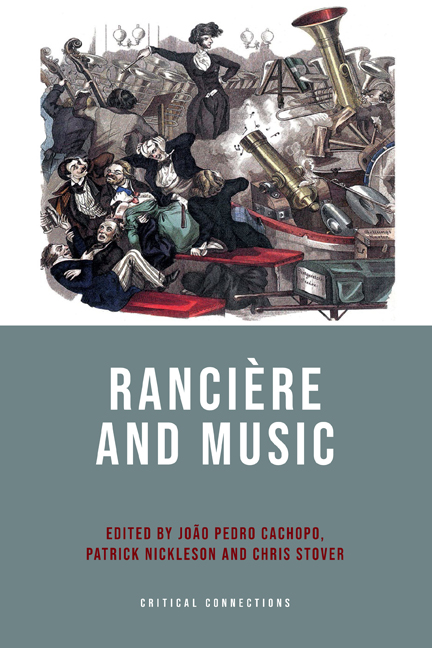Book contents
- Frontmatter
- Contents
- List of Examples
- Acknowledgements
- Notes on Contributors
- Introduction
- Part I: Music and Noise
- 1 Musique concrète and the Aesthetic Regime of Art
- 2 ‘Rip it up and start again’: Reconfigurations of the Audible under the Aesthetic Regime of the Arts
- 3 A Lesson in Low Music
- Part II: Politics of History
- 4 Wandering with Rancière: Sound and Structure under the Aesthetic Regime
- 5 Staging Music in the Aesthetic Regime of Art: Rancière, Berlioz and the Bells of Harold en Italie
- 6 Rancière on Music, Rancière’s Non-music
- 7 Coloured Opera and the Violence of Dis-identification
- Part III: Politics of Interaction
- 8 Musical Politics in the Cuban Police Order
- 9 Rancière and Improvisation: Reading Contingency in Music and Politics
- 10 Rancière’s Affective Impropriety
- Part IV: Encounters and Challenges
- 11 Rancière, Resistance and the Problem of Commemorative Art: Music Displacing Violence Displacing Music
- 12 Stain
- 13 On Shoemakers and Related Matters: Rancière and Badiou on Richard Wagner
- 14 Roll Over the Musical Boundaries: A Few Milestones for the Implementation of an Equal Method in Musicology
- Afterword
- A Distant Sound
- Works Cited
- Index
A Distant Sound
Published online by Cambridge University Press: 03 October 2020
- Frontmatter
- Contents
- List of Examples
- Acknowledgements
- Notes on Contributors
- Introduction
- Part I: Music and Noise
- 1 Musique concrète and the Aesthetic Regime of Art
- 2 ‘Rip it up and start again’: Reconfigurations of the Audible under the Aesthetic Regime of the Arts
- 3 A Lesson in Low Music
- Part II: Politics of History
- 4 Wandering with Rancière: Sound and Structure under the Aesthetic Regime
- 5 Staging Music in the Aesthetic Regime of Art: Rancière, Berlioz and the Bells of Harold en Italie
- 6 Rancière on Music, Rancière’s Non-music
- 7 Coloured Opera and the Violence of Dis-identification
- Part III: Politics of Interaction
- 8 Musical Politics in the Cuban Police Order
- 9 Rancière and Improvisation: Reading Contingency in Music and Politics
- 10 Rancière’s Affective Impropriety
- Part IV: Encounters and Challenges
- 11 Rancière, Resistance and the Problem of Commemorative Art: Music Displacing Violence Displacing Music
- 12 Stain
- 13 On Shoemakers and Related Matters: Rancière and Badiou on Richard Wagner
- 14 Roll Over the Musical Boundaries: A Few Milestones for the Implementation of an Equal Method in Musicology
- Afterword
- A Distant Sound
- Works Cited
- Index
Summary
I am well aware of the challenge raised by the organisers of this volume, which is devoted to the relationship that an author who has never or almost never taken music for an object entertained with this art and the thought regarding it. Responding to this challenge supposes two operations more or less knotted together: showing by example that its problematic finds in this domain a privileged application, and analysing the reasons why the author has not proceeded on his own behalf in this application. The contributions in this volume have generously responded to the first requirement and I thank the authors wholeheartedly. It is necessary that I attempt to respond to the second.
How is it that I have not spoken, or have spoken so little, about music? It is necessary first of all – and many contributions have done this – to sensibly relativise this diagnostic. It assumes that one looks for music where it should normally be: in works that clearly announce that they are occupied with art or aesthetics. It does not figure in Aisthesis or barely so – only in the detour of Appia and his mise en scènefor the Ring, which itself remained on paper. But the other great canonical art, painting, only appears by way of the detour of Hegel's gaze on two paintings by Murillo for which I have no particular affection. Nor do I have any for the Belvedere Torso with which the book starts and which is present more or less explicitly in a number of these scenes. My personal tastes have no bearing on the choice of these episodes. Katharina Clausius playfully suggests an explanation of the absence of music in Aisthesis as due to an insensitivity or a secret hatred that I have inherited from Fénelon via Jacotot. And she reminds us that the latter’s book Musiquedoes not speak about music at all. But in fact, I have not frequented Fénelon's texts apart from what was strictly necessary to understand Jacotot's usage. This is to say that he hardly had the capacity to communicate these sentiments on music to me – sentiments all the more complex because the same Mentor who condemns, in keeping with the Platonic tradition, softening music, takes, in another episode, the Orphic lyre to charm the Phoenician sailors by singing of the misfortune of Narcissus or the death of Adonis.
- Type
- Chapter
- Information
- Ranciere and Music , pp. 353 - 365Publisher: Edinburgh University PressPrint publication year: 2020



